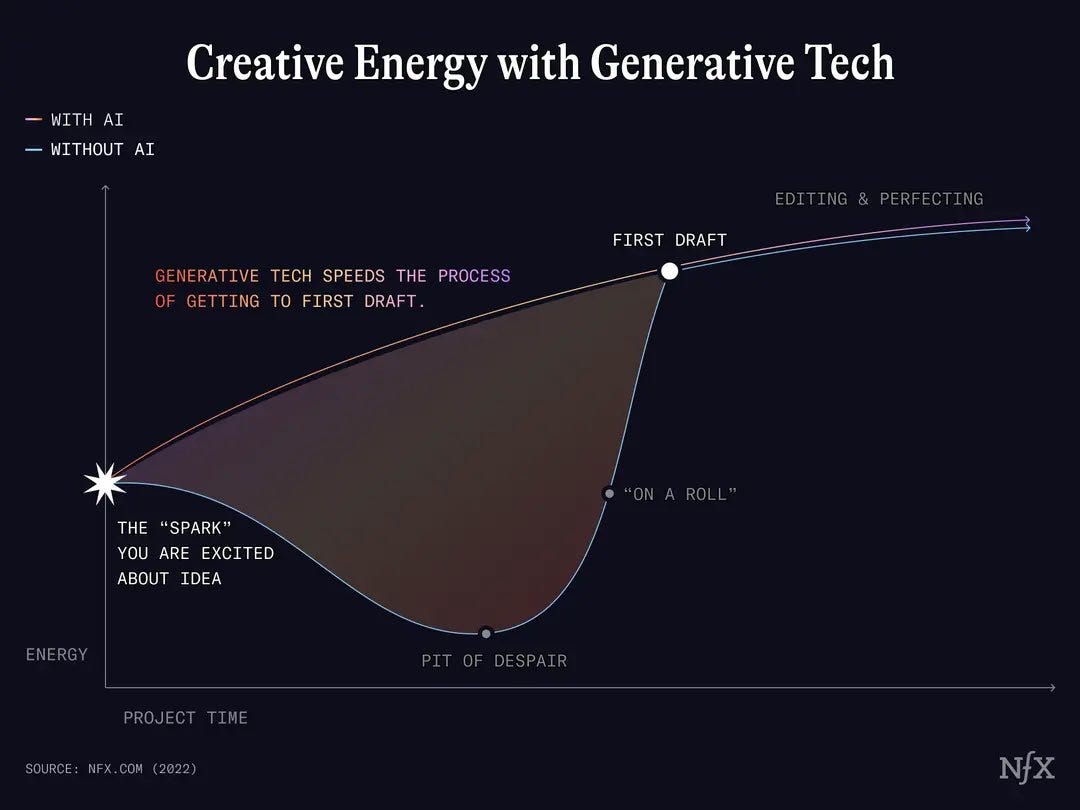Hey, I’m Jacob ✌️ Welcome to all of the product people who subscribed since last time! If you’re not a subscriber yet, I hope you’ll consider joining this band of like-minded folks who are all learning how to build better products. Questions or feedback? Drop ‘em here.
AI writing tools like Jasper, Lex and Copy.ai have gotten scary good. Happy Halloween 🎃
Over the last few days, I've experimented with all three and the output is not only convincingly human (mostly) but also half-decent writing. In this article, I’m going to try to be brutally honest about what this means for writers like me.
Based on my experiments, it can’t write stories like J. K. Rowling or construct arguments like C.S. Lewis. But it can certainly help you come up with ideas, flesh out an outline or write a compelling title! And it will only get better.
To me, this marks a turning point in the history of the internet. As with all revolutionary new technologies, jobs will be threatened and others created. So the question, “when will AI replace human writers” is an intriguing one filled with nuance and gradients.
To explore this question, I want to break this article up into two parts with some commentary in between.
Why I think AI will NEVER replace human writers
Why I think AI will 100% replace human writers
Let's dive in.
Why I think AI will NEVER replace human writers
1. AI is limited by its inputs
AI tools are only as good as their inputs. GPT-3, for example, was only trained on data up until 2020 when it launched so it has some limitations in regards to current events.
The ability to come up with fresh, new ideas is a defining characteristic of humans, something that artificial intelligence will never truly be able to do. Sure, AI can help you with the research and organization of your content, but it takes a human's creativity and intuition to come up with a truly great piece of writing.
2. Writing is an expression of lived experience
People have been writing for centuries as a way to express themselves and share their thoughts and ideas with the world. Thoughts and ideas that were born out of their lived experience. Despite the wealth of data at its disposal, AI doesn't have any lived experience. It's simply regurgitated experiences from those who's writing it’s ingested.
AI-powered writing tools are great at coming up with ideas, but they're not so good at being creative. They lack the ability to see the world in a new way, to change their point of view or come up with original concepts.
No matter how much data an AI-powered writing tool has, it will never be able to replicate the depth of understanding that a human writer has of the human experience. We have a unique ability to empathize with others and understand their motivations. This allows us to create characters that feel real to readers and tell stories that resonate on a deep level.
Telling a story is one of the most difficult things a writer can do. It requires a deep understanding of plot, character development, and pacing. AI-powered writing tools are still a long way off from being able to replicate these skills.
The best ideas come from humans, not machines, and it's the human connection and understanding that makes writing so special.
3. Writing is subjective
As with any art form, writing is deeply personal and subjective. What one person considers to be a masterpiece might seem like trash to someone else. This is something that AI will never be able to understand or appreciate.
Art is about emotion and feeling, two things that AI is incapable of experiencing. Sure, AI can analyze data and come up with a list of emotions that a particular piece of writing evokes but it will never be able to understand why those emotions are important or how they contribute to the overall meaning of the piece.
The human brain is an incredibly complex organ that's still largely a mystery to scientists. It's capable of things like higher-level thinking, creativity, and empathy—things that no machine, no matter how advanced, can replicate. So while an AI-powered writing tool might be able to churn out a decent piece of text, it will never be able to create something truly original or moving in the way that a human writer can.
What do you think?
Are you convinced? Do you think human writers are safe?
If so, I have a confession that might surprise you.
The three points that just convinced you AI wasn’t a threat was 100% written by AI 👀
That’s a powerful testimony to the advancements in AI in recent years, but to be honest, while I thought Jasper’s writing was decent, I didn’t think it was great. Mostly because those three arguments are incredibly nuanced arguments that would require a much deeper understanding of philosophy, art and the human experience to be convincing. Something that the AI wasn’t advanced enough to handle. But let a human writer like Sam Harris take a stab at it and I bet you he could build a compelling case.
Why I think AI will 100% replace human writers
Now for the flip side. Right now, many AIs can pass a basic Turing Test. And as it continues to improve, it’ll be able to move beyond merely passing as a human to being able to adapt for style, purpose, personality and more to mimic specific writers or write for specific audiences.
1. More improvements…
The developments in AI with GPT-3 and GPT-NeoX-20B over the last 2 years have been paradigm-shattering.
What they discovered is that there’s a direct correlation between the number of parameters and the quality of the AI’s output. The training set for GPT-3 is 175 billion parameters, which is 10 times bigger and, importantly, 10 times better than GPT-2 in terms of perplexity (a measure of how well the model predicts the next word in a sequence).
So obviously, they’re just going to continue increasing the parameter count until they hit some sort of ceiling. And until they hit that ceiling, I believe we’re going to see some mind-blowing advancements in AI over the coming years.
As the capabilities of AI continue to improve, the amount of human intervention required to produce a high-quality output will continue to decrease. Which is a good thing too, because the demand for fan fiction is about to be off the charts.
2. For more people…
The world is moving toward more consumption, not less. Pair that with an increased appetite for personalized content and you’ve got the perfect use-case for generative AI.
It’s not hard to imagine a future in which AI is responsible for the majority of content that’s consumed on the internet as content becomes more personalized at scale.
Readers will be able to plug in some basic information about what they want to read and AI will do the rest. Imagine being able to ask an AI bot to write you a forbidden love story between an Elf and a Dwarf in Middle Earth, written in the style of Harry Potter 🤯 Fan fiction is about to get wild.
Even though I think most human writers’ jobs are safe for now, I believe that, given enough time, some *types* of writing jobs will be replaced and, in its wake, new *types* of writing jobs will be born.
1-2 billion knowledge workers will become faster and better at their jobs. Some will be able to do jobs they couldn’t do before. New TYPES of jobs will be created. And while some jobs will be downgraded, threatened, eliminated – and that will cause fear and self doubt in 10s of millions of workers in the next 36 months – the expansion of people’s abilities, productivity, and efficiency will vastly outstrip the losses over all, generating trillions of dollars of value.
—NFX, Generative Tech Begins
Someone will need to provide the initial ideas for these stories, craft the complex themes and imagine the twist endings. Essentially, AI will help writers put flesh on the bones of the idea. Needless to say, the next generation of literary works will belong to “the idea people.”
3. In less time…
The third and most obvious reason is automation. AI can work 24/7 and doesn’t need things like sleep. It just… grinds.
When that idea for the Middle Earth love story comes to you before bed one night, you don’t have to wait for someone on Reddit to write it. You’ll be able to ask for it and start reading in seconds. And, since you requested it, it’ll sound like J.K. Rowling wrote it instead of some anonymous Redditor named @TruLuv69.
The simple fact is that it takes a lot of time for humans to formulate a thought, expand it into something big and bold and then craft the story around it. While it might take a human writer a day to write an article or a story, an AI could do it in seconds. Of course, the quality won’t be nearly as good right now. But the quantity it can produce is orders of magnitude greater.
Plus, to expand on the first point, not only can AI write quicker, it can learn quicker.
The average human writer is improving their writing skills at a much slower rate than an AI-writing tool. This is in part due to the number of different factors an AI can take into consideration when refining its writing.
Where does that leave us?
I think it’ll be a while before AI can catch up to the masters of the craft like Stephen King, Jane Austin or Malcom Gladwell. In fact… I’m not totally convinced that it will ever get there. Mostly because AI can only create something that is derivative or remixed. Will it ever be able to craft a story like Harry Potter that can weave complex themes like “love” throughout a fantasy universe? I’m not sure.
But I do know AI can be a powerful tool in the writer’s tool belt.
When faced with a blank page, it can be difficult to get started. A tool that can help you generate an outline, write an intro or come up with a title is just enough of a nudge to keep you in flow and help you avoid the pit of despair.
That’s where we are with AI right now.
NFX refers to these types of tools as “Generative Tech.” And while many may feel threatened by artificial minds generating new ideas, in 10 years, we’ll not only be comfortable with it, we’ll expect it. They will be come collaborators with us in the same way that the personal computer has become an invaluable collaborator in the creation process.
For now.
This article is a bit tongue-in-cheek. It's meant to highlight the potential of AI.
For now, I think we’re still figuring out exactly what it can do and how it will help us push the boundaries of creativity and the act of creation.
For now, AI is most likely to exist in the background of our everyday activities, helping us get things done with less friction and saving us the effort of doing them ourselves.
For now, I think a human writer will stand out against AI. Especially the masters of the pen.
For now.
Hit me with your thoughts in the comments below!
—Jacob ✌️
❤️ Smash that heart!
If you enjoyed this article or if it scared you a little, smash that heart icon to show some love! 🙏











